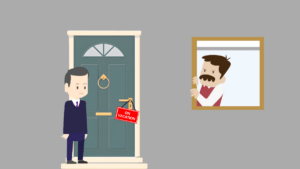If you’ve ever watched TV shows like “Can’t Pay? We’ll Take It Away” or “Call the Bailiffs: Time to Pay Up“, you may already have some idea of what a bailiff visit involves. But when it’s your own situation, it’s natural to feel worried, stressed, and unsure about what will really happen. Here at Shergroup, led by our CEO Claire Sandbrook, we know that the thought of Certified Bailiffs or High Court Enforcement Officers (HCEOs) arriving at your door can be overwhelming. Our aim is to demystify the process, give you clear guidance, and help you feel more in control.
In this blog, we’ll discuss the reality of a bailiff visit, what the law says, and the steps you can take if you receive a bailiffs letter or a notice of visit by the bailiff. We’ll also answer common questions like “What times can bailiffs visit?” and show you how to handle these situations calmly. From understanding the role of bailiffs in London and across the UK to dealing with High Court Enforcement solutions for debt recovery, we’ll walk you through it all. And because we’ve learned from the experiences shared on shows like “Pay or We Take It Away”, we’ve evolved our approach to help people navigate these challenging times. Remember, if you need professional advice or security services in the USA, Shergroup is just a call or click away.
Understanding Who Bailiffs Are and Why They Visit
What is a Bailiff?
A bailiff—sometimes called an enforcement agent—is someone appointed to enforce a court order or recover debts. Certified Bailiffs work within a set legal framework and must follow strict rules. Bailiffs can be employed by a court or by a private Debt Collection Agency authorised to carry out enforcement action. In some cases, High Court Enforcement Officers (HCEOs) come into play—these are specialist enforcement agents authorised by the High Court.
Why Do Bailiffs Visit?
Bailiffs visit a debtor’s home or business when payment hasn’t been made according to a court order. It might relate to unpaid rent, council tax arrears, parking fines, utility bills, or other debts. Often, the visit is a last resort after letters, phone calls, and notices have failed to resolve the situation.
If you’ve been ignoring a notice of visit by the bailiff or a bailiffs letter, hoping it will go away, it won’t. Bailiffs are tasked with recovering the debt, and if it remains unpaid, they may be authorised to seize certain belongings and sell them to cover the outstanding amount.
The Journey from Debt to Bailiff Visit
The Initial Stages
Usually, the process leading up to a bailiff visit starts with a creditor who wants their money back. This creditor might be a landlord, a local council, a private company, or even a government agency like HMRC. If regular reminders don’t work, the creditor may take the matter to court. Once a court order or judgment is obtained and the debtor still doesn’t pay, the creditor can escalate enforcement action.
High Court Enforcement
For larger sums—usually more than £600—creditors may choose to enforce their judgment through the High Court. At this stage, a High Court Enforcement Officer (HCEO) might become involved. HCEOs can operate anywhere in England and Wales and have broader powers than some other enforcement agents. They’re the individuals you might have seen in “Can’t Pay? We’ll Take It Away!” or other similar shows.
Bailiffs in London
While bailiffs operate across the UK, London’s dense population and high property values mean enforcement can be more frequent and high-profile in the capital. Bailiffs in London often deal with a wide range of debts, from commercial rent arrears to council tax debts, and are used to navigating the city’s unique challenges.
Receiving a Bailiffs Letter or Notice of Visit
One day you might open your mail (or email) and find a “bailiffs letter” or a “notice of visit by the bailiff.” Don’t panic—this is your opportunity to take action before things escalate.
What the Notice Means
A notice of an upcoming visit gives you a clear timeline. For example, if this is related to High Court Enforcement, you might have a set number of days (often 7 days) to pay the debt in full before the bailiff
visit. This notice is a last chance for you to avoid the distress of a physical visit.
How to Respond
- Communicate with the Creditor or the Bailiffs | Reach out and try to arrange a payment plan or settle the debt.
- Seek Professional Advice | If the situation is complex, talk to a legal adviser or a reputable Debt Collection Agency.
- Prepare Proof of Ownership | If you share the property or belongings with others, gather documents to show what belongs to whom.
Times Bailiffs Can Visit
One common question is: “What times can bailiffs visit?” Bailiffs usually can’t just turn up at any hour. In England and Wales, the general rule is that bailiffs should visit between 6 am and 9 pm, unless the court order states otherwise. These restrictions are in place to prevent undue distress.
However, the times may vary depending on the circumstances and the type of debt. For High Court Enforcement, rules are often similar, but always check current guidelines or consult a professional for the most up-to-date information.
What to Expect When a Bailiff Arrives
So, the bailiff has arrived—what now?
1. Identification |
They must identify themselves and show you proof of their authority. This usually includes a badge or ID card, a copy of the writ or warrant, and sometimes a letter of authorisation.
2. Entry Into Your Home |
Bailiffs cannot force entry for most debts on their first visit. They usually must be invited in, or they might enter through an unlocked door. However, for certain types of debt like unpaid criminal fines, they might have the right to use force if necessary.
3. Negotiation and Payment Arrangements |
Often, bailiffs will ask if you can pay the debt immediately. If you can’t pay in full, they may offer a repayment plan. Remember, they’re there to recover the debt, so if you show willingness to sort things out, it could lead to a more favourable outcome.
4. Taking Control of Goods |
If no agreement is reached, bailiffs can “take control of goods.” This means they’ll make a list of valuables that could be sold to cover the debt. Common items might include electronics, vehicles, or luxury goods. Everyday essentials—like your cooker or fridge—are usually exempt.
5. What They Can’t Take |
Bailiffs have rules to follow. They cannot take essential household items or tools you need for your work. They also can’t take items that don’t belong to you, so if you’re sharing a flat, make sure you have proof of ownership for your belongings.
The Emotional Toll and Dealing with the Stress
It’s normal to feel anxious or upset during this process. Shows like “Call the Bailiffs: Time to Pay Up” or “Can’t Pay? We’ll Take It Away” highlight the human side of debt enforcement—the anger, tears, and frustration. But remember, bailiffs are trained professionals. They must treat you fairly and adhere to a code of conduct.
You have the right to be treated with respect. If you feel you’re being harassed or unfairly treated, there are complaint procedures you can follow. Understanding that bailiffs are just doing their job might help reduce some stress. They’re there to enforce a judgment, not to pass moral judgment on your circumstances.
High Court Enforcement Solutions and Claire Sandbrook’s Approach
Claire Sandbrook, CEO of Shergroup, has seen firsthand how tough these situations can be, especially through her involvement in High Court Enforcement and from the lessons learned featured in shows like “Can’t Pay? We’ll Take It Away!” Over time, Claire has evolved her approach to debt enforcement. Shergroup now focuses on balancing firmness with compassion, recognising that many people in debt are facing challenging personal circumstances.
Our Approach:
- Clear Communication | We aim to ensure that everyone understands their rights and responsibilities.
- Fair Solutions | While the debt must be paid, we encourage humane repayment plans that prevent unnecessary hardship.
- Professional Standards | As Certified Bailiffs and HCEOs, our team follows strict guidelines and best practices.
- Additional Support | In some cases, we can point you towards debt advice services or financial counselling to help you navigate the process.
How Debt Collection Agencies and HCEOs Work Together
A Debt Collection Agency might be involved before the matter reaches the bailiff stage. These agencies typically try to recover debts through letters, phone calls, and negotiations. If these efforts fail and a court order is obtained, High Court Enforcement might come into play for larger debts.
For property-related issues or commercial rent arrears, HCEOs often handle enforcement due to their special authority under High Court writs. If you’re dealing with bailiffs in London, Shergroup and other reputable firms can offer High Court Enforcement Solutions that not only resolve the debt but also secure the property and ensure compliance with legal standards.
Handling Multiple Debts and Complex Situations
It’s not uncommon for someone facing a bailiff visit to have multiple debts. Council tax arrears, unpaid rent, credit card debts, and utility bills can all pile up. In these cases, bailiffs might be acting on multiple court orders, which can be even more stressful.
What to Do |
- Prioritise Debts | Some debts (like council tax and rent arrears) have more severe consequences. Focus on these first.
- Seek Advice | Charities like Citizens Advice or StepChange can offer free guidance. A professional Debt Collection Agency might also help consolidate or negotiate your debts.
- Be Honest | When dealing with bailiffs or HCEOs, honesty about your financial situation is key. Hiding the truth usually leads to more trouble.
The Importance of Knowing Your Rights
Knowledge is power. The more you understand about the bailiff process, the better you can protect your rights and deal with the situation effectively. Know what bailiffs can and can’t do. Understand what items are protected from seizure. If you’re unsure about anything, seek professional advice.
Key Points |
- Bailiffs must show ID and proof of their authority.
- They can’t force entry for most debts on the first visit.
- They must follow a code of conduct and treat you fairly.
- You have the right to complain if they don’t follow the rules.
Preparing for the Worst, Hoping for the Best
No one wants to deal with bailiffs, but if you can’t pay a debt, it’s wise to be prepared. Keep documents organised, know where your proof of ownership papers are, and have a plan for discussing payment options if they arrive. If you know a visit is coming—perhaps you’ve received a bailiffs letter or a notice of visit by the bailiff—take this time to seek advice, arrange your finances, and prepare yourself emotionally.
Call to Action
Dealing with bailiffs and High Court Enforcement can be stressful, but you don’t have to go through it alone. If you’re facing a bailiff visit, need advice on debt recovery, or want to secure your property, Shergroup is here to help.
Get in Touch |
- Visit www.shergroup.com for more information on our services.
- Contact our team directly at [email protected].
- If you need security services in the USA, reach out and we’ll connect you with our experienced specialists.
Don’t let uncertainty control your situation—act now, get informed, and regain your peace of mind.
By Phone | 020 3588 4240
Website | www.shergroup.com and you can chat to us from here
Email | [email protected]
Facebook | Check out Shergroup on this channel and message us
Twitter | Check out ShergroupChat on this channel and message us
LINKEDIN | Check out Shergroup’s LINKEDIN – and please FOLLOW us!
Instagram | Check out ShergroupChatter and
YouTube | Check out Shergroup YouTube Channel – and Subscribe to Our Channel!
Google My Business | https://maps.app.goo.gl/J1pUNBKfFv2SVnjQ6





